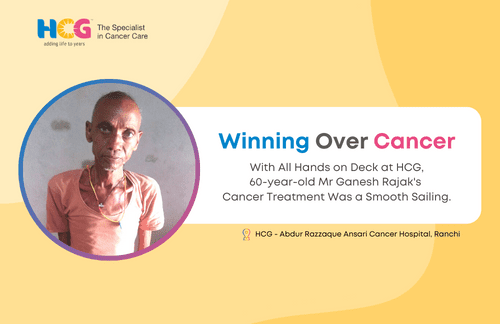
09 Sep, 2022

09 Sep, 2022
Story of Ganesh Rajak, 60-year-old Stomach Cancer Winner
Certain types of cancer do not show any symptoms in the early stages; this makes their diagnosis and treatment challenging. Another aspect that makes their diagnosis difficult is that the symptoms that they cause are very much similar to those of various less severe health conditions. This can often lead to misdiagnoses and delayed diagnoses.
Stomach cancer is one such cancer that may not show any symptoms at first, and by the time the patient learns that something is wrong, their condition will be in a locally advanced stage. It is for this reason that it becomes paramount for patients to not ignore any symptoms, especially if they last for more than 2 weeks.
Ganesh Rajak of Ranchi was also diagnosed with stomach cancer. How did he know he had stomach cancer? What brought him to HCG? What treatment did he receive? Was he able to defeat cancer? Read this story to know more.
Ganesh Rajak, 60, started experiencing unexplained weight loss. Not knowing the cause, he decided to see a doctor. At HCG - Abdur Razzaque Ansari Cancer Hospital, he was subjected to numerous tests, and the doctors found that he had moderately differentiated adenocarcinoma of the stomach or stomach cancer.
Without further delay, Ganesh and his family members decided that he would undergo his treatment at HCG - Abdur Razzaque Ansari Cancer Hospital. Upon carefully going through his medical reports and assessing his overall medical condition, the specialists at HCG decided that he would require multimodal treatment comprising chemotherapy and surgery.
This multimodal approach helps specialists ensure that there are no cancer cells left behind after the treatment and that the patient will be able to experience an optimum clinical outcome.
Chemotherapy: Ganesh’s treatment began with a specific type of chemotherapy known as FLOT chemotherapy, which involves the administration of four different chemo drugs. The 4 cycles of neoadjuvant chemotherapy administered before the surgery helped in shrinking the tumour.
Surgery: The surgical intervention was planned by the surgical oncology team led by Dr. Prakash Bhagat, senior consultant – surgical oncology and Dr. Amitesh Anand, senior consultant – surgical oncology at HCG – Abdur Razzaque Ansari Cancer Hospital.
Right before the surgery, Ganesh was made to undergo preoperative physiotherapy. He was recommended for a total gastrectomy with D2 nodal clearance (removal of the entire stomach). The following procedures were performed after the gastrectomy and D2 nodal clearance:
After a series of complex surgeries, Ganesh was made to undergo postoperative physiotherapy.
Preoperative and postoperative physiotherapy sessions play a pivotal role in ensuring the patient’s faster recovery after surgery. These sessions were extremely helpful for Ganesh, and he was able to recover well from the surgery. After discharge, he was advised to consume a high-protein and high-calorie diet.
Presently, he is doing okay and is under follow-up care.
Stomach cancer is one of the silent cancers. Our reports show that more than 30% of stomach cancer cases are diagnosed when they are in locally advanced stages. Patients with locally advanced cancers will need more comprehensive treatment, and the quality of clinical outcomes is also significantly impacted by the stage at which they are diagnosed.
One way to reduce your risk of stomach cancer is to learn more about the possible factors that can increase your risk of stomach cancer and work towards mitigating them. The following are the key risk factors for stomach cancer:
If you carefully observe, most of the risk factors mentioned here are lifestyle-based and can be easily altered. In other words, switching to a healthy lifestyle and receiving appropriate medical attention whenever necessary can significantly reduce your cancer risk.
Moving on to the symptoms of stomach cancer—patients can find it difficult to identify stomach cancer symptoms. These symptoms are often similar to those of other less severe GI problems like stomach infection, gastric reflux, indigestion, irritable bowel syndrome, etc. The following are some of the early signs of stomach cancer:
If any of the above symptoms last for more than 2 weeks, it should be brought to a physician’s attention, as this helps in early detection and timely treatment.
As a specialist in cancer care, we are well-versed in offering a broad spectrum of cancers – both early-stage and advanced-stage. The advanced technology and innovative treatment strategies we employ help us deliver the highest quality cancer care. Our specialists use the unique multidisciplinary and personalized treatment approaches, which play a significant role in making sure that every patient who walks in through the doors of HCG receives the right care, the first time.